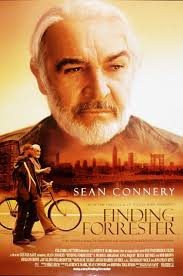The movie Finding Forrester is more than just a story about writing; it’s a journey of self-discovery, resilience, and unexpected mentorship. It beautifully captures the intertwined paths of two protagonists, Jamal Wallace, a young, talented writer, and William Forrester, a reclusive Pulitzer Prize-winning author. Through their unlikely friendship, the film unearths what it truly means to "find yourself" and, for Forrester, to rediscover a part of himself he had long buried.
At its core, Finding Forrester tells us something profound: that finding oneself is rarely a straightforward process. Rather, it’s a series of revelations, challenges, and moments of courage. For Jamal, a young man from the Bronx, finding himself means stepping into his own power, believing in his talent, and confronting stereotypes. Forrester, meanwhile, has lived a life hidden away from the world, fearing vulnerability after a traumatic loss. As he mentors Jamal, he is forced to confront his own fears and regrets, rediscovering a part of himself he thought was lost.
1. The Power of Mentorship: A Journey with Someone Else's Guidance
In our search for identity, mentorship can be a powerful guiding force. When we see Jamal and Forrester together, we witness two people from different worlds finding common ground through their shared love of words. Forrester teaches Jamal about the discipline and courage it takes to write, but he also encourages him to be unfiltered and genuine. This bond becomes a mirror in which each can see their potential and, most importantly, their worth. Sometimes, it takes the insight of someone else to help us recognize the beauty and talent we’ve been carrying all along.
In our own lives, mentors can help us ask the questions we didn’t know we needed to ask and can challenge us to step beyond our comfort zones. They help us to confront our fears, face our insecurities, and give us the strength to truly embrace our own potential.
2. Defining Your Own Success: Resisting Stereotypes and Expectations
Jamal’s journey of self-discovery is not just about talent; it’s about resisting the boxes others place him in. Coming from a rough neighborhood, he’s often judged for his background, even as he excels academically and athletically. His struggle mirrors a universal truth: society is often quick to define us, to label us, and to assume it knows us. Finding oneself, as Jamal demonstrates, involves pushing back against these judgments and defining one’s path on one’s own terms.
For anyone seeking to understand their purpose or place in the world, Jamal’s story is a reminder that self-discovery doesn’t always look like others expect. It’s about listening to our own voice, even when it’s hard, and choosing to honor that voice over the cacophony of outside opinions.
3. Rediscovery: The Courage to Face What We’ve Left Behind
For Forrester, finding oneself is less about discovery and more about rediscovery. After a traumatic loss, he withdrew from the world, hiding behind his talent and legacy while keeping his heart guarded. His friendship with Jamal reawakens in him the courage to face the parts of himself he’s abandoned. In rediscovering the beauty of writing and companionship, Forrester learns that it’s never too late to embrace a new chapter of life.
In our own lives, there may be parts of ourselves that we’ve left behind—talents, dreams, or relationships. Rediscovery takes courage because it often means facing pain, regret, or loss. But as Forrester shows us, rediscovery is as powerful as discovery. It brings healing and allows us to reclaim parts of ourselves that were never truly lost.
4. Stepping into the Unknown
Finding yourself, whether for the first time or in a new phase of life, means stepping into the unknown. For Jamal, this meant submitting his work, standing up for his talent, and ultimately, letting his guard down. Forrester takes an even greater leap when he decides to leave his self-imposed isolation and reconnect with the world. These choices are difficult, even terrifying. But through their willingness to risk vulnerability, both Jamal and Forrester remind us that self-discovery requires a leap of faith.
In life, the journey to finding ourselves is paved with uncertainties. But every step we take toward authenticity brings us closer to a life that feels truly our own.
Finding Yourself, Again and Again
Finding Forrester is a story of courage, resilience, and the transformative power of connection. Jamal and Forrester, two seemingly unlikely companions, show us that finding oneself is a continual journey. Whether we are uncovering new strengths or reclaiming old passions, every step we take brings us closer to the person we are meant to be.
In the end, self-discovery is not a one-time destination; it’s a lifelong journey of rediscovery and renewal. Like Jamal and Forrester, we find ourselves not only in solitude but also through others who help us see ourselves more clearly than we could alone.
- Get link
- X
- Other Apps
- Get link
- X
- Other Apps

Comments
Post a Comment